A simple guide to getting subcontracting right in Horizon Europe—based on the official Grant Agreement rules.

Introduction
Travel is often a key part of any Horizon Europe project—whether you’re going to a project meeting, a conference, or visiting a partner organisation. But when it comes to justifying those travel and subsistence costs, many teams get tripped up by the details.
Mistakes with travel claims are one of the most common reasons auditors reject costs or delay payments. The good news? With a little knowledge and good habits, you can keep your funding safe and make travel reporting easy.
What Counts as Travel and Subsistence Costs?
Travel and subsistence costs cover the expenses needed for project staff to travel and carry out activities linked to your Horizon Europe project.
Examples of eligible costs include:
- Transport: Plane, train, bus tickets, car rental, fuel (if justified), taxis (with good reason).
- Accommodation: Hotel stays or other necessary lodging during the trip.
- Subsistence (per diems or daily allowances): Meals, small expenses, and incidentals while travelling, in line with your organisation’s standard policy.
- Conference or event registration fees: If directly related to the project.
Who can claim these costs?
Project staff, researchers, or other personnel listed as working on the action—when their travel is directly linked to the project activities.
Key point: The trip must be necessary for the project, planned or approved, and supported by clear evidence.
The Golden Rules for Eligibility (Based on Article 6)
Not every travel expense will be accepted just because it “helped the project.” To be eligible for reimbursement in Horizon Europe, your travel and subsistence costs must follow a few golden rules:
- Direct link to the project:
The trip must be necessary for carrying out project work—like meetings, fieldwork, or conferences directly related to your tasks.
- Planned or approved:
Travel should be included in your project plan (Annex 1) or formally approved by your coordinator/supervisor before you go.
- Reasonable and in line with your organisation’s rules:
Only claim standard, reasonable costs. Overpriced hotels, business class tickets, or luxury meals are usually not accepted unless there’s a clear, justified reason.
- No personal or extra days:
Expenses for private holidays, tourist activities, or days before/after the project activity are not eligible.
- Fully documented:
Every cost must be backed up by original documents—tickets, boarding passes, invoices, payment proofs, agendas, and approval emails.
- No double funding:
Never charge the same expense to more than one project, even if it seems justified.
IMPORTANT: If any of these conditions aren’t met, the EU auditor can reject the cost—even years after the trip!
Common Mistakes (and How to Avoid Them)
Travel and subsistence claims are some of the most frequently rejected costs in Horizon Europe projects. Here’s how to avoid the classic errors:
- Forgetting to keep original receipts: If you lose the ticket or hotel invoice, you can’t claim the cost. Always scan and upload documents as soon as you return.
- Claiming costs for non-project activities: Mixing personal trips with project travel, or staying extra days for sightseeing, can get your claim rejected.
Only expenses for approved project tasks count.
- Not providing proof of participation: Auditors often ask for evidence you actually attended the meeting or event (signed attendance sheet, badge, agenda, photos).
- Claiming flat rates without following your organisation’s policy: If you use per diems (daily allowances), make sure they’re calculated and justified according to your official internal rules and usual accounting practices.
- Forgetting to get travel approved: Last-minute or unplanned trips without formal approval are a red flag. Get the “ok” before you book.
What Documents Should You Keep?
To make sure your travel and subsistence costs are approved, always keep:
- Tickets and boarding passes
- Hotel invoices
- Receipts for all claimed expenses
- Proof of payment (credit card/bank statement)
- Conference or event agendas
- Attendance lists or badges
- Official approval for the trip (email or signed form)
- Calculations for per diems/daily allowances (if used)
- Any additional justification (for unusual costs, business class, etc.)
Pro tip: Scan or photograph documents as soon as you get them. Store them in a dedicated digital folder, or use Kronis to keep everything together and ready for audits.
Final Thought
Managing travel and subsistence costs in a Horizon Europe project doesn’t have to be a source of stress or confusion. Yes, the rules can seem strict at first, but they exist to make sure public money is spent fairly and transparently—and that every team is on a level playing field.
If you keep good habits from day one—like getting approval before you travel, saving every ticket and receipt, and keeping your documents organised—you’ll make life much easier for yourself when reporting time comes. The best teams don’t wait until the end; they build simple routines that turn compliance into just another part of their workflow.
And remember, you don’t have to do it all alone. Tools like Kronis are designed to make this process smooth and foolproof, so you can spend less time on paperwork and more time making your project a success. With the right habits and a little digital help, you’ll have nothing to worry about when it comes to travel claims and audits.

Article 6 in Horizon Europe: Practical Tips for Eligible and Ineligible Costs



